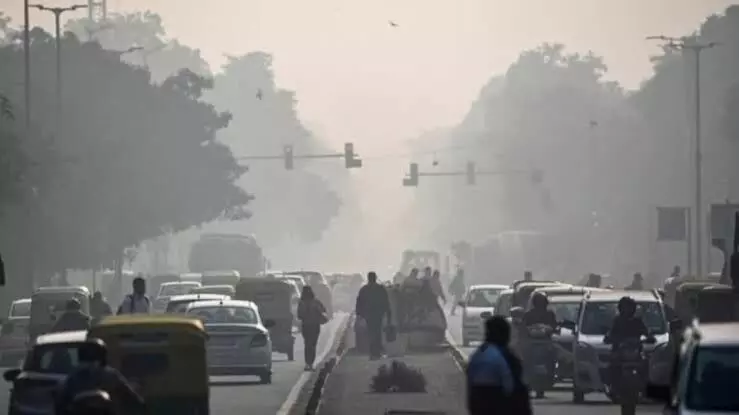Air pollution: Hyderabad’s AQI in ‘moderate’ category; readings frequently hit 100
Air pollution levels were recorded at moderate level in Sanathnagar and Zoo Park areas of Hyderabad
By Newsmeter Network
Hyderabad: Pollution levels at the traffic junctions see a rise in winter reducing the air quality
Hyderabad: Come winter, Hyderabad witnesses a consistent decline in air quality. While the city’s residents enjoy the dip in temperatures, the accompanying smog raises serious health and environmental concerns.
Rising Pollution Levels
Over the past two weeks, Hyderabad’s Air Quality Index (AQI) has mostly hovered in the ‘moderate’ category, with daily readings frequently exceeding 100.
On Wednesday, areas like Sanathnagar and Zoo Park recorded AQI levels of 175, placing them in the upper range of moderate pollution.
Meanwhile, Bollaram and ECIL reported relatively lower but still concerning levels of 114 and 90, respectively.
PM2.5, a microscopic pollutant linked to respiratory and cardiovascular issues, remains the primary culprit. Health officials have warned that the persistent presence of these particles increases the risk for vulnerable groups, particularly those with pre-existing conditions like asthma or heart disease.
“We’re seeing a steady rise in particulate matter during the cooler months due to temperature inversion. This traps pollutants closer to the ground, worsening air quality,” said a statement from the Telangana State Pollution Control Board (TSPCB).
Weather Patterns Aggravating the Situation
Hyderabad’s minimum temperature dropped to 15.1 degrees Celsius this week, with even cooler readings of around 12 degrees reported in BHEL and Bollaram. As temperatures fall, the air becomes denser, allowing pollutants to linger longer.
Suman Shah, from the India Meteorological Department (IMD), explained, “Winter conditions often exacerbate pollution levels. Partly cloudy skies and low wind speeds limit the dispersion of pollutants, contributing to smog formation.”
The forecast for the coming days predicts partly cloudy skies, with temperatures ranging from 15 to 30 degrees Celsius. However, experts caution that cooler weather may further deteriorate air quality unless mitigating measures are adopted.
Faulty Monitoring Adds to Woes
Public concerns about Hyderabad’s air pollution are compounded by inconsistencies in the city’s air quality monitoring. Between November 12 and 19, several of the city’s 14 pollution sensors failed to function continuously.
“Missing data creates a distorted picture of air quality, potentially leading to misinformed decisions,” said Dr. Siddharth Kumar, an environmental scientist. “For instance, parents may unknowingly expose children to harmful pollution levels if they believe the air is clean based on inaccurate data.”
On Deepavali night, real-time monitoring stations in several areas, including Patancheru and Sanathnagar, went offline as pollution levels spiked. Despite these lapses, the TSPCB averages out readings, that some residents feel undermine public trust.
Health Impacts and Call for Action
Health professionals have expressed concern over the prolonged exposure to moderate AQI levels, which can cause breathing discomfort for sensitive individuals. “Even moderate pollution can lead to long-term health issues if exposure is continuous,” said Dr. Akanksha Reddy, a pulmonologist.
Community members are urging the government to adopt proactive measures. Suggestions include limiting construction activity, regulating vehicle emissions, and ensuring uninterrupted monitoring. “Transparency in data is crucial. People need accurate information to protect themselves and their families,” said a city-based health advocate.
What Lies Ahead?
With winter tightening its grip, Hyderabad’s air quality is expected to face further challenges. While the city has yet to experience the severe smog seen in northern states, experts warn against complacency.
“Immediate interventions, including stricter pollution control measures and public awareness campaigns, could help mitigate the impact of the season’s worsening air quality” Reddy concluded.